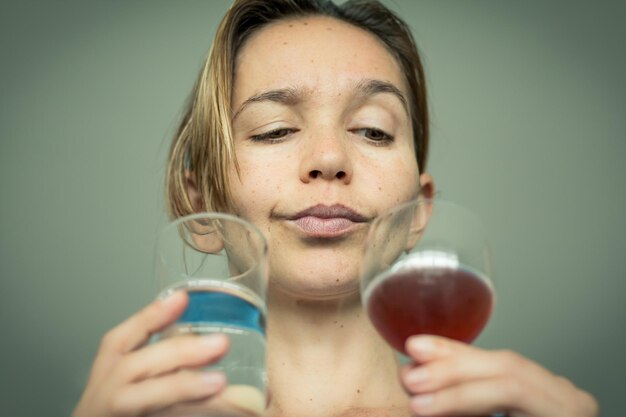Understanding the Root Causes of Cystic Acne: Essential Insights for Clearer Skin
Cystic acne is more than just a typical breakout; it’s a deeper, often more painful issue that affects many people worldwide. Unlike common acne, which might pop up as blackheads or whiteheads, cystic acne forms deeper below the skin and is characterized by swollen, red cysts. But what causes this severe type of acne, and how can you manage it effectively?
If you're grappling with cystic acne or just curious to understand it better, you're in the right place. This article explores the root causes of cystic acne, considers the contributing factors from multiple angles, and offers practical insights to help you navigate this skin condition.
The Inner Workings: What Triggers Cystic Acne?
Hormonal Fluctuations: The Silent Instigator
Hormones play a pivotal role in the development of cystic acne, especially during times of fluctuation. Androgens, which are male hormones present in both men and women, can increase during puberty, menstruation, pregnancy, or due to conditions like polycystic ovary syndrome (PCOS). Elevated androgens can enlarge sebaceous glands, leading to an increase in oil production.
- Puberty: This period is marked by an increase in hormonal levels, making teenagers more susceptible to cystic acne.
- Menstrual Cycle: Hormonal changes before and during menstruation can trigger body changes, including the onset of acne in women.
- Pregnancy and PCOS: Both bring significant hormonal shifts, sometimes exacerbating this skin condition.
Genetic Predisposition: When Family History Matters
Genetics can play a significant role in the development of cystic acne. If your parents or siblings have experienced severe acne, you may have a higher chance of developing it as well.
- Inherited Traits: Certain genetic components can affect how your skin reacts to testosterone, contributing to acne formation.
- Skin Sensitivity: Genetic predisposition may also determine how sensitive your skin is to hormonal fluctuations and bacteria.
Lifestyle Factors: Diet, Stress, and More
While hormones and genetics set the stage, lifestyle factors can influence the severity and frequency of cystic acne outbreaks.
Diet and Nutrition: More Than Skin Deep
Research suggests a link between diet and acne severity. While no single food causes acne, certain dietary patterns can contribute to breakouts.
- High Glycemic Foods: Foods that increase insulin levels, like sugar and processed carbohydrates, might trigger acne.
- Dairy Products: Some studies indicate a potential link between dairy consumption and acne severity.
- Healthy Choices: Incorporating omega-3 fatty acids and antioxidants can support skin health.
Stress: The Invisible Aggravator
Stress doesn't directly cause cystic acne, but it can worsen it. Stress prompts the adrenal glands to release cortisol and androgen, leading to increased oil production.
- Cortisol Connection: Elevated cortisol levels can push sebaceous glands into overdrive, resulting in more oil and potential acne flare-ups.
Environmental Influences: Outside Factors at Play
The environment you live in can also affect your skin condition.
- Humidity: High humidity levels can increase oil production and trap sweat and dirt in your skin, potentially worsening acne.
- Pollution: Airborne pollutants can clog pores and irritate the skin, contributing to acne development.
Navigating Treatment Options: A Mixed Approach
Skincare Routine: Keeping It Clean and Simple
An effective skincare routine can make a significant difference in managing cystic acne.
- Gentle Cleansers: Use non-comedogenic cleansers to remove excess oil and prevent pore blockages.
- Moisturize Wisely: Even acne-prone skin needs moisture. Use oil-free, non-comedogenic moisturizers to avoid drying out your skin.
Medical Interventions: Professional Help
Sometimes, over-the-counter products aren't enough, and professional intervention becomes necessary.
- Dermatological Treatments: These may include prescription creams, antibiotics, or retinoids, which help reduce inflammation and bacterial growth.
- Hormonal Therapy: Birth control pills or anti-androgen medications can help regulate hormones for women experiencing cystic acne related to hormonal imbalance.
Holistic Approaches: The Natural Path
Incorporating holistic practices can complement traditional treatments.
- Mindfulness and Relaxation: Reducing stress through meditation, yoga, or deep-breathing exercises can mitigate stress-induced flare-ups.
- Herbal Supplements: Some prefer natural supplements such as zinc, omega-3 fatty acids, and probiotics, which can support skin health from within.
Preventive Measures: Reducing the Risk of Breakouts
Monitor Your Diet: Thoughtful Eating
Maintaining a balanced diet can support better skin health.
- Incorporate Vegetables and Lean Proteins: These provide vital nutrients that can support skin integrity.
- Stay Hydrated: Drinking adequate water helps maintain skin hydration and overall health.
Lifestyle Adjustments: Stress and Sleep
Managing stress and ensuring adequate sleep can also influence skin health.
- Prioritize Sleep: A consistent sleep pattern supports skin regeneration.
- Manage Stress Levels: Engage in activities that help balance emotional and mental health.
Key Takeaways for Healthier Skin
For anyone dealing with cystic acne, understanding these contributing factors can offer a clearer path toward managing the condition effectively. While cystic acne is often challenging, combining knowledge with the right strategies can support healthier skin:
- Understand Hormonal Influences: Recognize how hormonal changes can impact your skin.
- Consider Genetics: If acne runs in your family, be proactive in managing symptoms.
- Adopt Healthy Habits: Prioritize a balanced diet, regulate stress, and maintain a simple skincare routine.
- Seek Professional Guidance: Don’t hesitate to consult with dermatologists for tailored treatment options.
- Holistic Practices: Integrate relaxation techniques and consider natural supplements to support overall well-being.
By taking these steps, you'll be on the path to clearer skin and greater self-confidence. Remember, every skin journey is unique, and it might take some time to discover what works best for you.
🌟 Summary of Key Insights 🌟
- Hormonal Impact: Hormones like androgens increase the risk of cystic acne.
- Genetic Influence: Family history plays a role in your acne predisposition.
- Dietary Adjustments: Limit high-glycemic and dairy foods for improved skin health.
- Stress Management: Reduce stress to decrease the likelihood of breakouts.
- Skincare Routine: Use non-comedogenic products and maintain a simple cleansing routine.
- Professional Assistance: Consult dermatologists for specialized treatments if necessary.
- Holistic Support: Incorporate stress-reducing activities and consider natural supplements.

